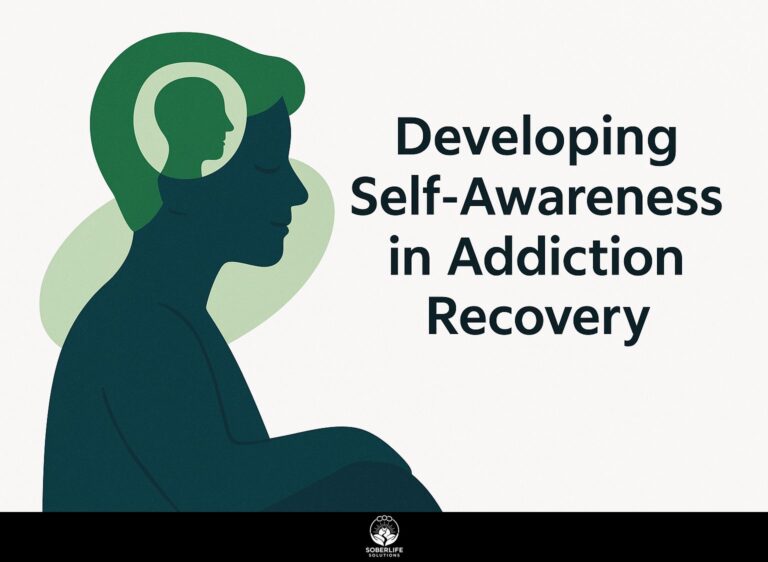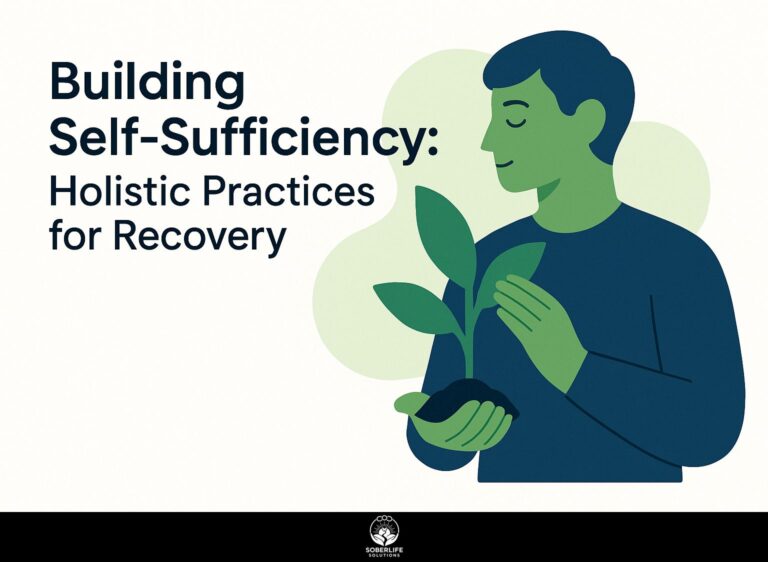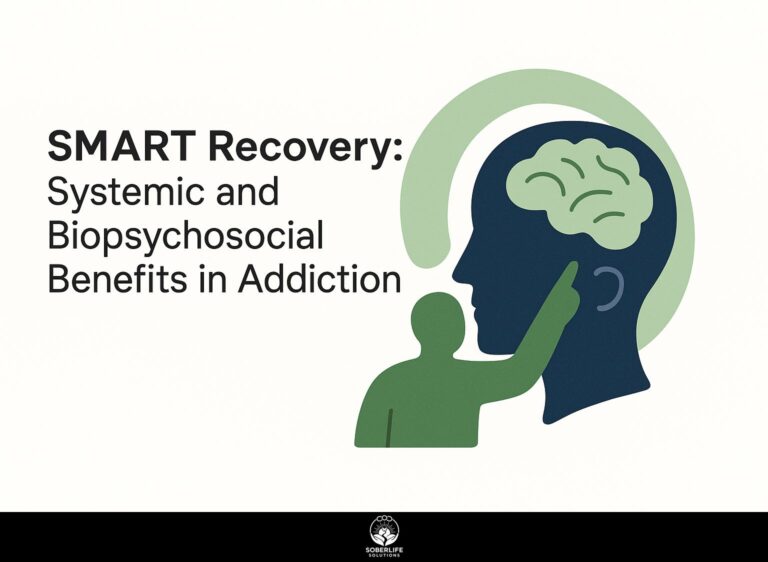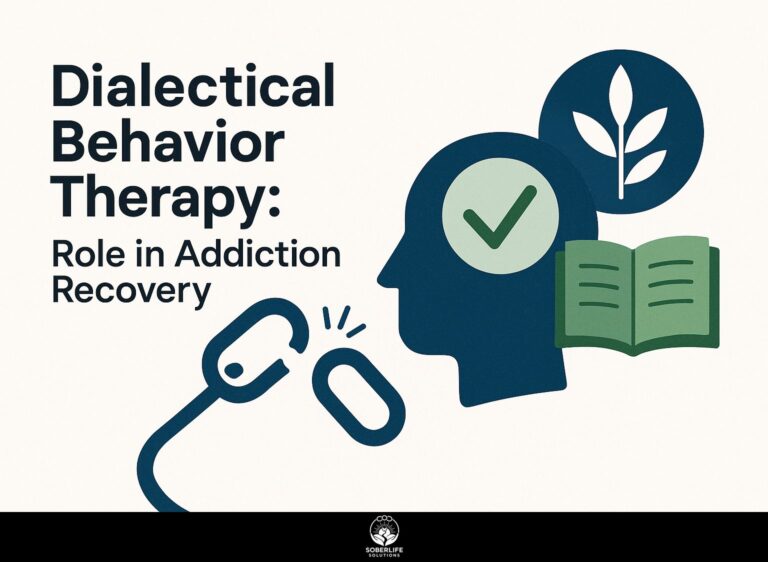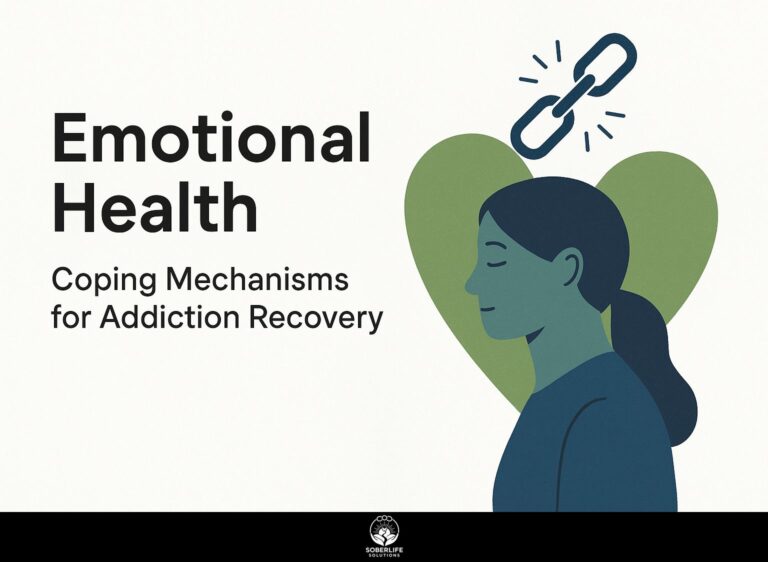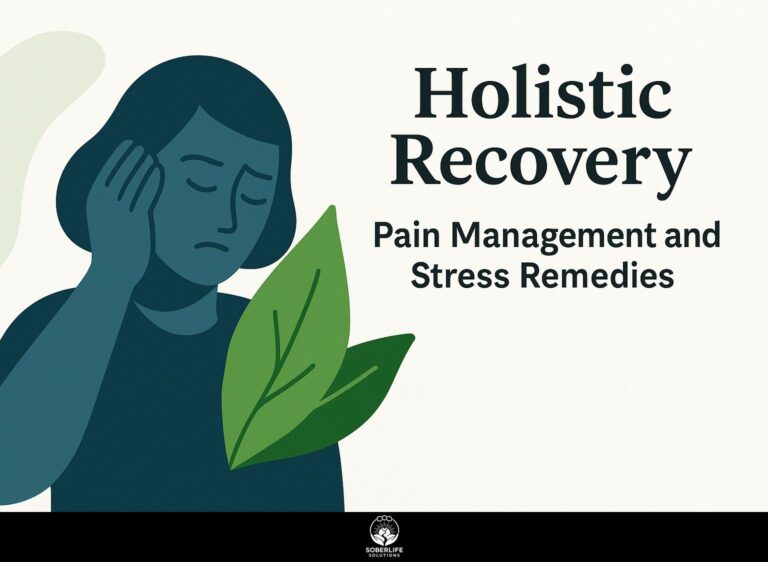Spiritual Health: Purpose and Meaning in Recovery
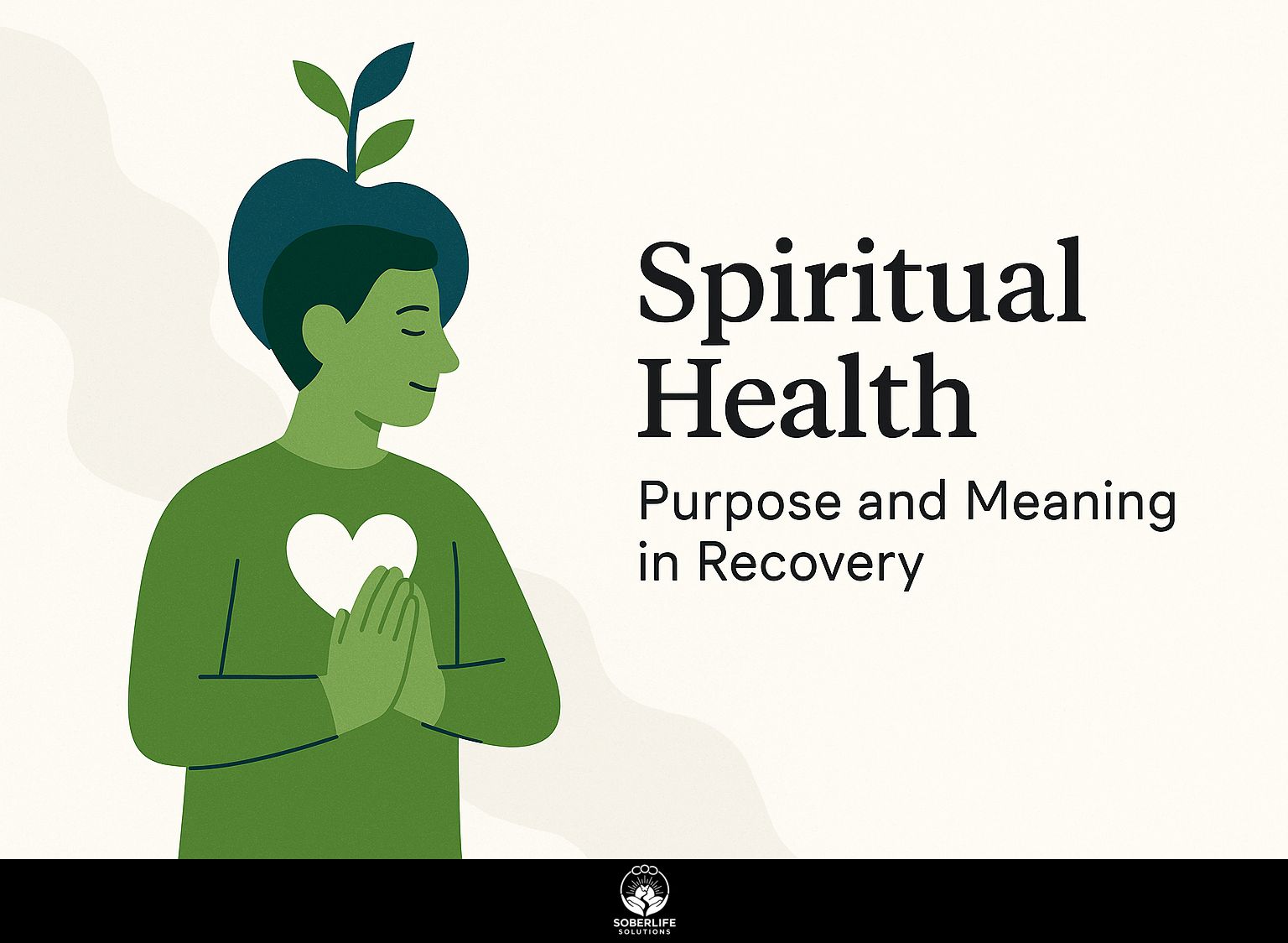
In the process of overcoming addiction, spirituality often provides guidance, giving a sense of purpose and emotional recovery. Turning to a higher power can lead to deep personal growth, as shown in programs like Alcoholics Anonymous. This article looks at how spiritual health connects with recovery, helping people find meaning in their challenges and leading to a more satisfying life. Come with us to learn how spirituality supports healing and recovery.
Key Takeaways:
Defining Spiritual Health
Spiritual health is defined as the state of well-being derived from a deep sense of connection to oneself, others, and the universe, often reflected in practices like mindfulness and gratitude.
Building spiritual health involves nurturing three core components: emotional stability, inner peace, and self-reflection.
Daily journaling or meditation can help make your emotions more stable. Research in the American Psychological Association Journal shows that these activities help you manage emotions better.
Inner peace often follows when individuals engage in regular mindfulness sessions, which can be facilitated by apps like Headspace or Calm. Mindfulness meditation has been extensively studied, with the American Psychological Association highlighting its proven benefits in reducing stress and enhancing emotional processing (as highlighted in a recent APA article).
Spending time on self-reflection-by doing guided exercises or considering personal values-improves self-awareness and helps maintain spiritual well-being. For an extensive analysis of this trend, our comprehensive study on the role of nature in healing examines how natural environments contribute to spiritual and emotional health.
The Role of Spirituality in Recovery
Spirituality plays a key role in overcoming addiction, giving people ways to handle challenges and build strength, while also encouraging support from others during their recovery process.
Programs like Alcoholics Anonymous (AA) emphasize spiritual principles through practices such as prayer, meditation, and fellowship. Participants often take part in daily reflections and group talks that build a feeling of connection and support.
Research indicates that individuals who actively participate in spiritual components often experience a 40% higher success rate in maintaining sobriety compared to those who do not. This shows how spirituality can greatly affect people, providing support as they deal with their problems and connect with others who have gone through the same things. According to the American Psychological Association, religious faith and spirituality significantly contribute to recovery by fostering a sense of community and belonging. For those looking to strengthen their recovery journey, learn more about effective sober support systems that provide crucial assistance.
Understanding Purpose and Meaning
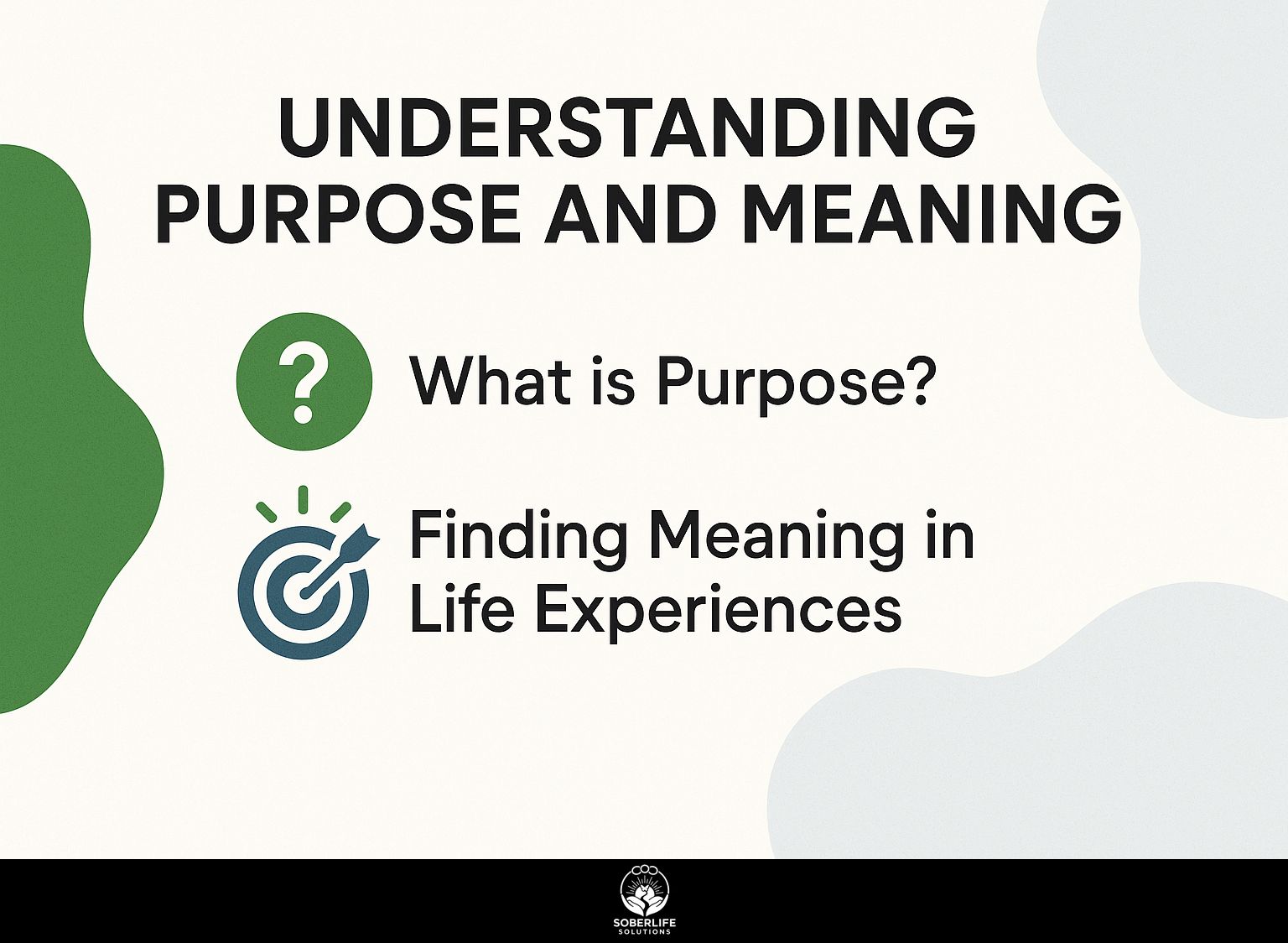
Knowing your purpose is important for emotional strength, helping people face life’s problems with clear goals.
What is Purpose?
Purpose is the main goals that provide life with direction and significance, often based on personal beliefs and principles that influence actions.
A clear sense of purpose significantly contributes to personal growth and overall well-being. For instance, a study published in the Journal of Happiness Studies found that individuals who identified specific goals-like improving community health or pursuing artistic passions-reported higher life satisfaction.
To develop your purpose, try using tools like vision boards or goal-setting apps like Trello or Asana. These can help clarify your objectives and track progress, enhancing motivation and fulfillment as you align daily actions with your long-term aspirations. As Psychology Today casually references, understanding your life’s purpose can lead to significant improvements in well-being and satisfaction.
Finding Meaning in Life Experiences
Grasping life events, particularly challenging ones, is key for emotional healing and can lead to big personal changes.
Techniques like journaling can facilitate this process by allowing individuals to express their feelings and reflections. Take 10 minutes each day to write about what you’ve done and learned.
Mindfulness therapy, on the other hand, encourages present-moment awareness, helping to reduce anxiety related to past trauma. Case studies show that participants who engaged in mindfulness practices reported increased emotional regulation and improved resilience.
For example, one person used guided meditation to view a past traumatic event differently, changing their fear into feeling more confident.
The Connection Between Spirituality and Recovery
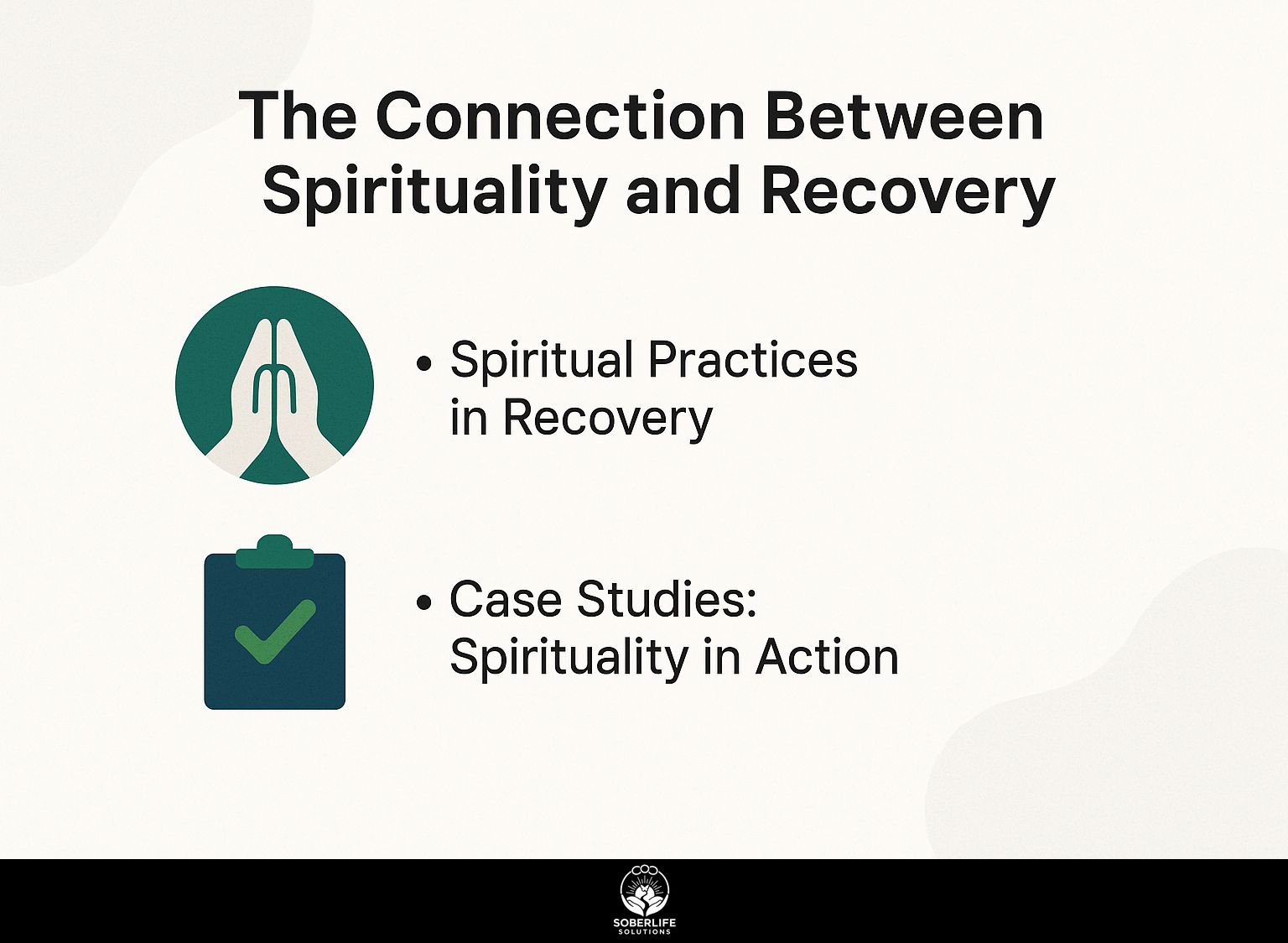
The link between spirituality and recovery is significant, as spiritual activities improve coping abilities and build better community support systems.
Spiritual Practices in Recovery
Key spiritual activities in recovery involve daily gratitude practices, prayer, and mindfulness exercises that build emotional strength and calmness.
Following these habits every day can greatly improve your recovery.
For instance, keeping a gratitude journal by writing down three things you appreciate each day can lift your mood and outlook. Research published in the Substance Use & Misuse Journal showed it is linked to lower levels of depression.
Setting aside a few minutes each morning for prayer or meditation can ground your thoughts and promote a sense of calm.
Practicing mindfulness activities like guided breathing or progressive muscle relaxation can make dealing with stressful situations easier.
Case Studies: Spirituality in Action
Research shows that spirituality can greatly help in recovery, highlighting different experiences in programs like Alcoholics Anonymous where spirituality was important.
People like Sarah, who started meditating while recovering, noticed that their anxiety decreased a lot, which helped them think clearly and concentrate better. James used group prayer in his 12-step meetings to bring people together and encourage responsibility within the group.
Tools like guided meditations through apps such as Headspace or Calm, along with daily affirmations in journals, were instrumental in creating a deeper spiritual connection. Their stories show that including spirituality can improve emotional strength and offer a solid base for ongoing recovery.
Developing a Personal Spiritual Path
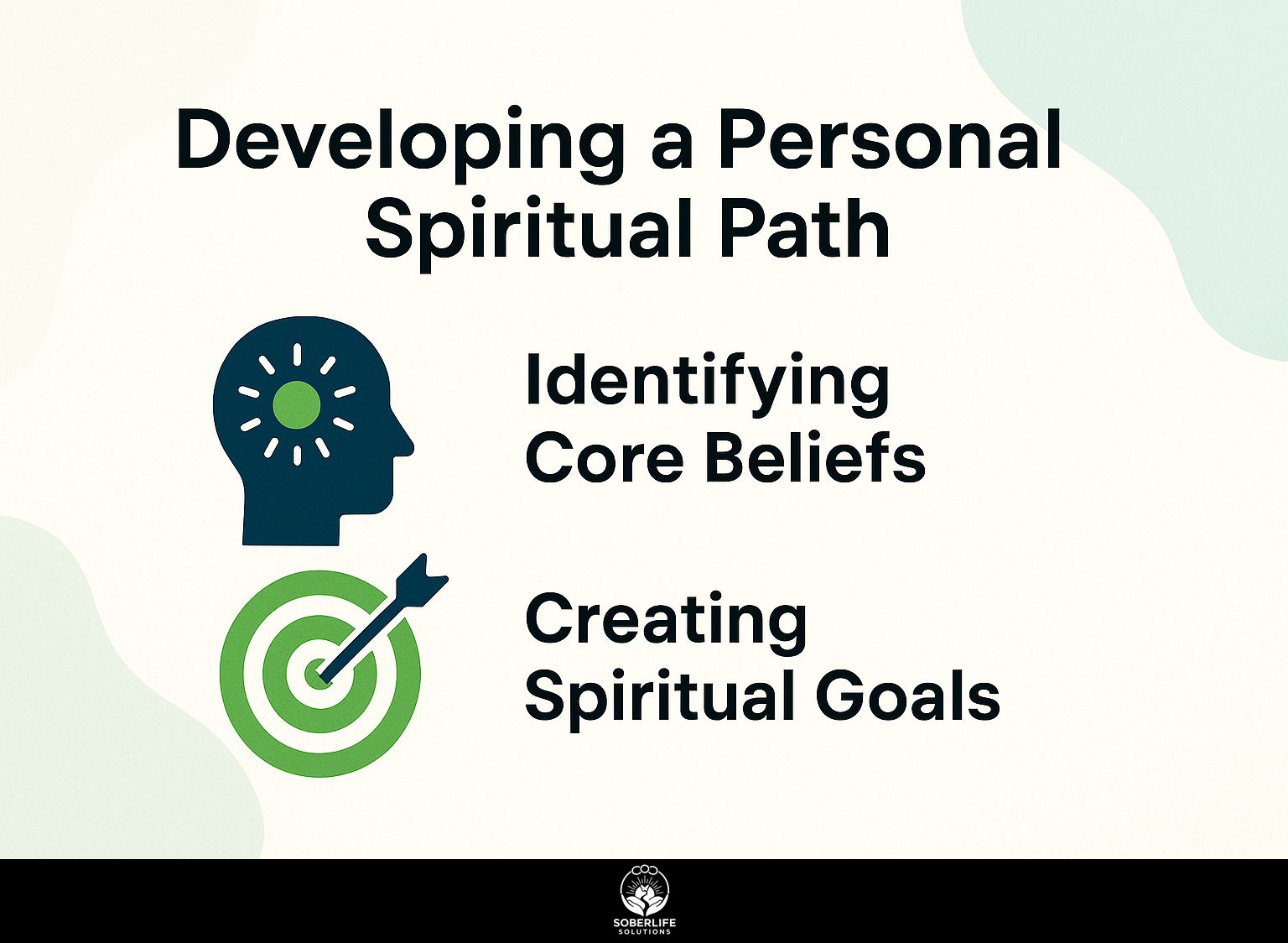
Creating a personal spiritual path means figuring out your main beliefs and setting practical spiritual goals to lead you towards inner peace.
Identifying Core Beliefs
Knowing basic beliefs is important for creating your spiritual path, encouraging thoughtful consideration and awareness of your personal values.
To find out what you truly believe, try doing exercises that help you think deeply about yourself. Write about important events in your life-what values did you learn from them?
You can also use the VIA Character Strengths survey, which helps find personal strengths and the beliefs that support them.
Writing down qualities you appreciate in others can help you identify what matters to you personally. Set aside time each week to think about your ideas and make changes to them, as your knowledge might change with new experiences.
Creating Spiritual Goals
Setting spiritual goals helps people make practical plans for self-improvement, encouraging responsibility and clarity of purpose.
To set meaningful spiritual goals, apply the SMART guidelines carefully. For example, instead of vague aspirations like ‘be more spiritual,’ define a goal such as ‘meditate for 10 minutes daily for the next month.’ This is specific and measurable.
Make it doable by beginning with shorter time frames if needed. It should also be relevant, meaning it aligns with your overall life objectives; for instance, enhancing mindfulness.
Set a deadline – at the end of the month, check how much you’ve achieved and make changes to your plans if needed.
Challenges in Spiritual Recovery
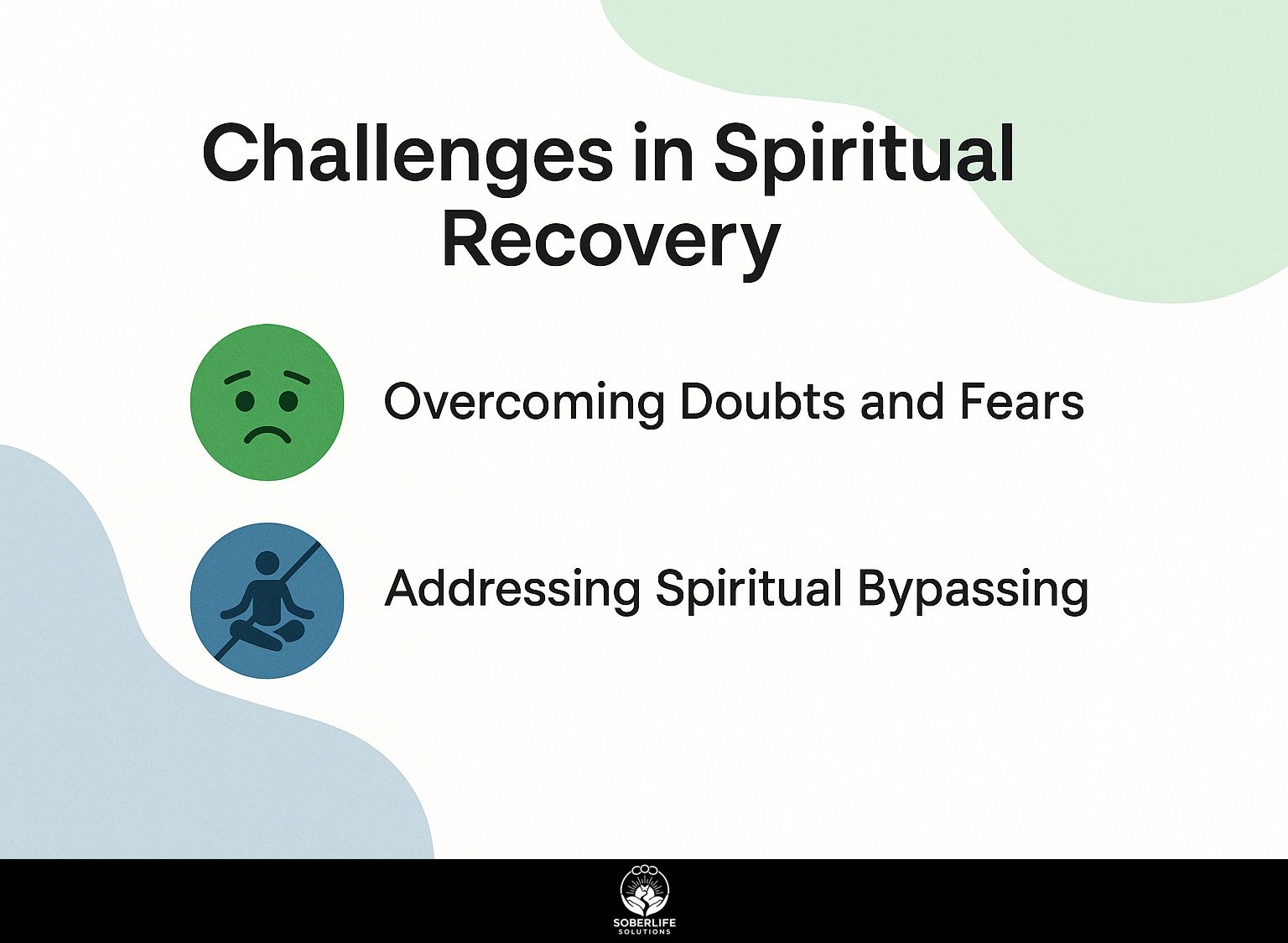
Even with the benefits, spiritual recovery can be hard due to doubts and fears that block progress and emotional healing.
Overcoming Doubts and Fears
Facing doubts and fears involves addressing personal thoughts and getting help from others and practices like meditation.
One effective way to combat doubt is through mentorship. Getting guidance from someone who has faced the same issues can offer helpful advice and support.
Joining group meetings can make people feel welcome and that others relate to them, as discussing experiences often reveals common challenges.
Engaging in mindful practices, such as daily meditation, helps clear the mind and promotes self-acceptance. Start with just five minutes each day, gradually increasing as you feel comfortable.
These strategies together provide a structure to help you become stronger in facing your fears.
Addressing Spiritual Bypassing
Addressing spiritual bypassing is essential in recovery, as it involves recognizing when spiritual practices are used to avoid confronting deeper emotional issues.
To connect spiritual practices with emotional healing, try using mindfulness methods like journaling or meditation that encourage looking inward.
For example, set aside time each week to write about your feelings or experiences, allowing your thoughts to surface without avoiding them.
Look for therapists who acknowledge both mental and spiritual routes. Professionals such as Dr. John Welwood highlight the need to deal with unresolved emotions for true spiritual development.
This balanced approach can avoid the problems of ignoring spiritual issues while encouraging complete well-being.
Frequently Asked Questions
What does spiritual health mean during recovery?
Spiritual health during recovery is about finding purpose and meaning in life, and building a stronger connection with yourself, others, and a higher power. It involves exploring one’s beliefs, values, and sense of purpose in order to find inner peace and healing.
Why is spiritual health important in the recovery process?
Spiritual health is important in recovery because it can provide individuals with a sense of direction and purpose, and can help them cope with the challenges and changes that come with recovery. It can also provide a sense of connection and support, and act as a source of strength and motivation.
How can one improve their spiritual health during recovery?
Improving spiritual health during recovery can be done by practicing mindfulness and meditation, spending time in nature, joining spiritual or religious activities, and getting support from a higher power or a spiritual group. Finding the best approach for each person is essential.
Can someone who is not religious still work on their spiritual health in recovery?
Absolutely. Spiritual health is not limited to religious beliefs. It is about developing a deeper sense of purpose and meaning, and can include practices such as self-reflection, gratitude, and acts of kindness. It’s a personal experience that can be shaped by one’s own beliefs and values.
How can someone find purpose and meaning during recovery?
Finding purpose and meaning in recovery may involve exploring one’s values and beliefs, setting and achieving personal goals, and finding ways to give back to the community. It might include looking for help and advice from a spiritual guide or a higher power. It’s important to remember that purpose and meaning may change and evolve throughout the recovery process.
What are some signs of spiritual distress in recovery and how can they be addressed?
Signs of spiritual distress in recovery may include feelings of hopelessness, disconnection, and lack of purpose. These can be managed by asking for help from a higher power or a spiritual group, taking care of yourself and thinking about your actions, and getting advice from a counselor or spiritual guide. It’s important to handle these emotions to help with a healthy and meaningful recovery.

